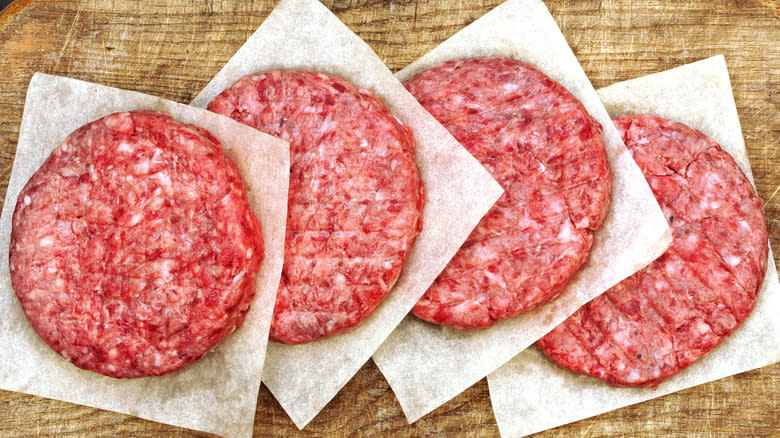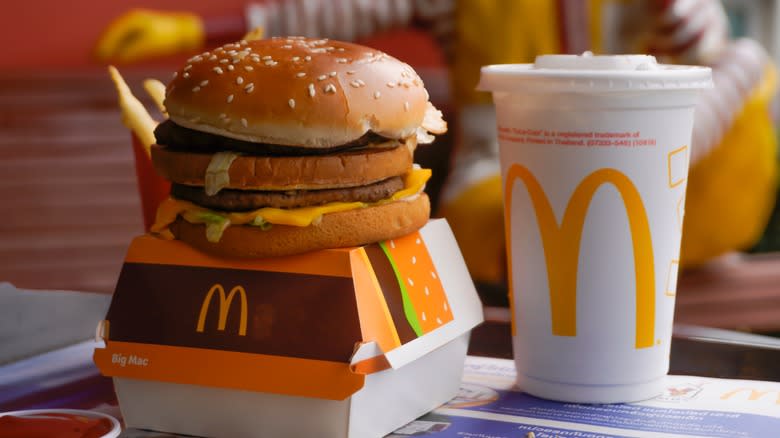While there are plenty of fast food giants out there, there’s none quite as iconic as McDonald’s. Known for its juicy burgers ranging from the Big Mac to simple cheeseburgers, there are tons of options on the menu for you to sink your teeth into. If you’re a fan of these burgers and other Mickey D’s menu items, however, there’s something you might want to know — those juicy beef patties are made by mixing meat from various batches. That means that your burger can actually contain meat from over 100 different cows.
The company states that butchers mince and shape the beef into patties, and it’s during this process that beef from various batches can cross over. With that said, McDonald’s still takes care to make sure that its hamburgers are up to quality standards. On its corporate website, the chain asserts, “All of our burger patties in the U.S. are always made with 100% USDA-inspected beef.” So, although they contain a mix of different cattle, they’re still safe to consume.
Read more: The Ultimate Ranking Of American Fast Food Restaurants
Dissecting What’s In Your McDonald’s Burger


While McDonald’s patties may be made up of over 100 cows, that doesn’t mean that they’re packed full of ingredients you don’t want to eat. On its website, the company reassures customers that McDonald’s burgers are just beef: “Our patties contain no preservatives or fillers, and the only thing we ever add is a touch of salt and pepper when the patties are sizzling hot on the grill.”
In fact, the chain states that the pickles are the only ingredients on its burgers that contain any artificial colors, flavors, or preservatives, which you can always skip if you don’t want to consume those kinds of ingredients. Instead, the burgers are made up solely of a variety of cuts of meat, including sirloin, chuck, and round, which are ground together to form the patty mixture. Now, that’s not to say that the company’s burgers aren’t without their flaws.
For one thing, the company gas-flushes its burgers as part of the packaging process to help them last longer. These gases, which could be substances like nitrogen or carbon dioxide, don’t affect food safety but might be a bit off-putting to some. Furthermore, up until the 2010s, McDonald’s is reported to have made burgers with pink slime, a chemical-containing beef byproduct. While this practice may have ceased, it still gets you thinking about what other methods the company might be implementing that could affect the quality of its beef.
McDonald’s Is Making An Effort To Be Ethical And Sustainable


While you might be prepared to forgo your next McDonald’s Big Mac, don’t jump the gun just yet. Despite the fact that McDonald’s mixes meat from different delivery batches, the chain still takes care to make quality burgers. Besides ensuring that the patties contain 100% beef, McDonald’s also makes moves toward limiting the use of antibiotics in its supply chain. Since 2018, the brand has implemented policies regarding sourcing beef and has been following guidelines outlined by the World Health Organization (WHO) and the World Organization for Animal Health (WOAH) for antibiotic use in cattle.
Still, there’s some controversy surrounding the beef suppliers that McDonald’s works with, as, although the company is making moves to reduce antibiotic use, some of the products it gets from suppliers have still been linked to antibiotic resistance. At the same time, McDonald’s is taking measures to make its beef sourcing more sustainable. For one thing, more than 98% of its beef sources support deforestation-free supply chains. McDonald’s has also established regenerative grazing programs.
Despite these efforts, there’s still some work to be done. The company produced over 53 metric tons of greenhouse gases in 2019, which is associated with its beef production. However, at the end of the day, while it might not sound ideal to be eating burgers made from hundreds of cows, you can still rest assured that the company is working toward sustainable practices surrounding its beef.
Read the original article on Daily Meal
